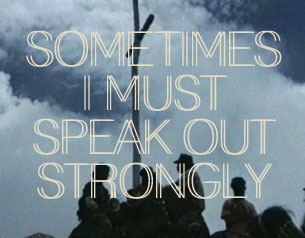Sometimes I Must Speak Out Strongly
 BACKGROUND
BACKGROUND
Timor Leste, former colony of Portugal, declared Independence in 1975 and was immediately invaded by Indonesia. Following abuses and massacres, Bishop Ximenes Belo won the 1996 Nobel Peace Prize for his courageous stand in defence of the voiceless majority in his country. Many expected the young man to be amenable to Indonesian ambitions but the Bishop multiplied the size his church. But he is under pressure from conservative senior Catholic bureaucracy in Rome for speaking out. Bishop Belo says he will accept the Nobel Peace Prize only on condition that he can fight for the human values of justice, peace and reconciliation.
THE FILM This film documents the background to the award of the 1996 Nobel Peace Prize to Bishop Carlos Ximenes Belo and the roving representative of Timor's pro independence movement, Dr Jose Ramos Horta, (later elected president of his nation). The struggle for independence in the half island of Timor Leste continued for 24 years, even as the military battle of guerrillas in the mountains waned, the political struggle in the towns grew. The people's 'only defence' was a Catholic Church which, despite pressure, continued to articulate the people's moral (and legal) right to choose their rulers. The Massacre of Santa Cruz when some 2000 demonstrators were fired upon became the turning point in Timor Leste's long agony. The award of the Nobel Peace Prize confirmed the turn in world opinion and some three years after this film was made East Timor finally won its legal right to a referendum on independence.
RESUME After the Massacre of Santa Cruz, Bishop Belo denounces Indonesia for the killings in Church. An account of Timor's recent history shows 400 years of Portuguese colonial rule through a brief civil war to invasion by Indonesia and resistance by guerrillas fighting in the mountains. 20,000 Indonesian soldiers are dead, and up to 200,000 Timorese support the guerrillas. Carlos Ximenes Belo attended colonial church schools and a seminary like most of Timor's elite, but war and famine turned people desperate. Dr Jose Ramos Horta says Indonesia thought Bishop Belo would be amenable, but instead he led a non-violent Timorese revival defending his people's human rights and religious values. In 1991 the images of the Santa Cruz Massacre in this film became a wake up call to the world, which led to the award of the Nobel Peace Prize to Belo. There are growing numbers in the church abroad speaking out in Belo's defence, even as protestors outside the cathedral in Deli are stoned by Indonesian police, and the Timorese are tortured to death by soldiers. Belo still insists, 'I will receive (the Nobel prize) on condition we fight to make known the human values, justice peace and reconciliation and to respect the will of the people.' Bishop Belo is under pressure from the Vatican but says 'I must talk, sometimes I must talk strongly'. See full film at: http://vodsite.journeyman.tv/store?p=3752&s=Sometimes+I+Must+Speak+Out+Strongly
